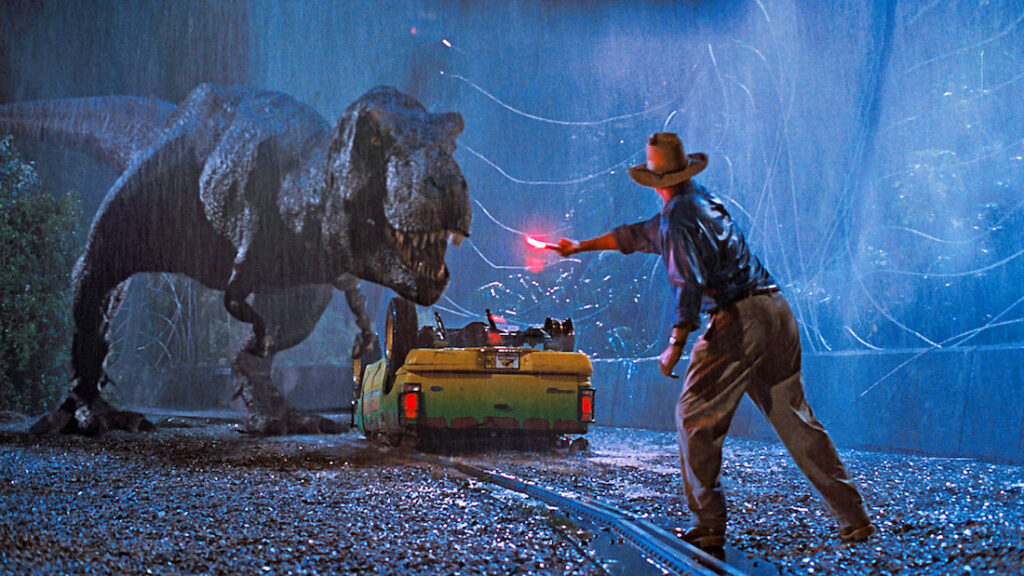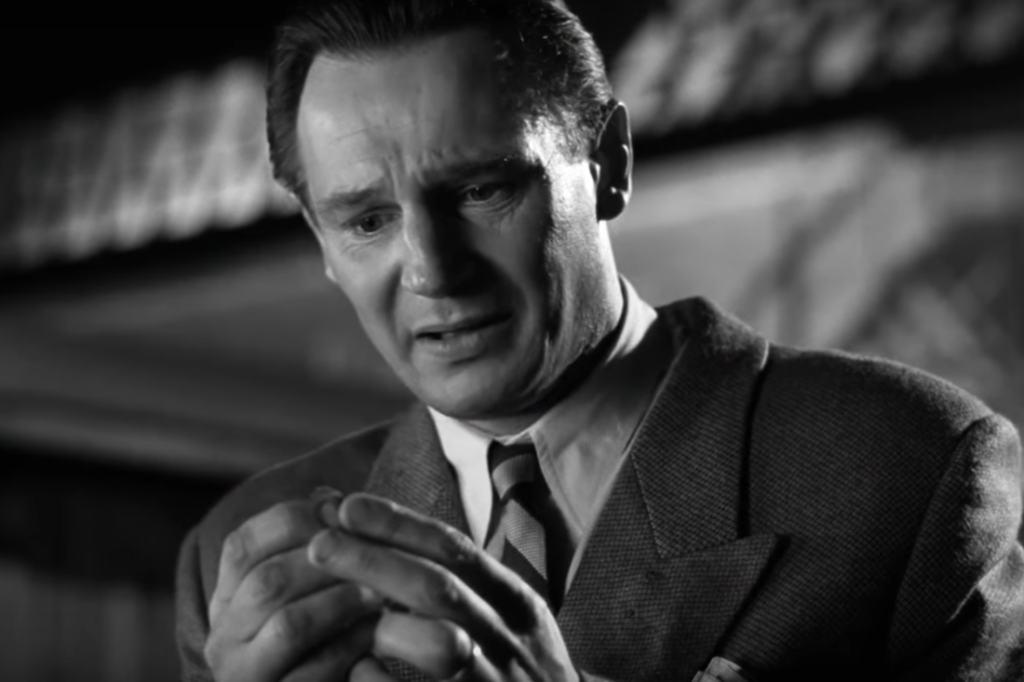The Fabelmans is being hailed as Steven Spielberg’s most personal film to date — the first time he directly pulls from his life, both emotionally and literally. And naturally, because it’s an autobiographical film about the legendary filmmaker, it’s a movie about cinema.
Yes, both of those things a true, to an extent, but something even more compelling to explore is how The Fabelmans is Spielberg’s finest manifestation of how he has used filmmaking as a way to cope with his personal reality and trauma.
This film reveals how cinema has been his perfect tool for catharsis throughout his life — and there’s proof even in his earlier films.
Let’s take a look at some of his other films to get an understanding of how Spielberg has always, from the very beginning, used his films as a way to cope with reality and trauma.
Got your own autobiographical script like Spielberg? Enter ScreenCraft’s True Story & Public Domain Screenplay Competition!
Jaws: Facing the Unknown
What is Jaws About?
Jaws is a classic thriller that has captivated audiences since its release in 1975. While the film’s main plot revolves around a man-eating great white shark terrorizing a small beach town, it also explores deeper themes related to fear, masculinity, and the unknown.
What is Jaws Really About?
One of the most prominent subtextual themes in Jaws is the fear of the unknown, which is reflected in the way the shark is mysteriously presented — which was initially only because they could not get the mechanical shark to work correctly. The shark is rarely shown in full, and when it is, it’s often in quick, ominous shots that only heighten the tension to create a more compelling experience.
This fear of the unknown can be seen as a reflection of Spielberg’s personal life — seeing as he grew up in a broken home and often felt like an outsider. This feeling of not belonging may have influenced his approach to the film and his decision, subconscious or not, to create a monster that is shrouded in mystery.
The Cathersis
The catharsis in Jaws is clear. Not only do the characters confront their fear of the unknown, they literally blow it to pieces.
Jurassic Park: Controlling the Uncontrollable
What is Jurassic Park About?
Jurassic Park is about a group of scientists that travel to a remote island to tour a theme park full of dinosaurs that were created using DNA. It’s a dream come true for all the visitors until the animals break out and turn their incredible journey into a nightmare.
What is Jurassic Park Really About?
Jurassic Park was a groundbreaking science fiction film that explores the ethical implications of bringing extinct animals back to life through genetic engineering. While the film is primarily a thrilling adventure classic, it also explores much deeper themes related to human ambition, control, and the consequences of playing God.
Subtextual Theme: The Dangers of Human Ambition and Control
One of the primary subtextual themes in Jurassic Park is the danger of human ambition and needing to have control. The film’s main characters, who are attempting to create a theme park with genetically engineered dinosaurs, are portrayed as overly confident but reckless in their pursuit of scientific discovery. This theme can be seen as a reflection of Spielberg’s own experiences with success and ambition — seeing as he has often been criticized for being too controlling on set and pursuing projects that are too ambitious, especially in his very early career.
We will get to this more when exploring The Fabelmans, but the idea of control can actually be considered what initially started Spielberg’s journey as a filmmaker–his need to make a film about a toy train crash in order to feel as if he has some type of control over his life as a child–after being scared by The Greatest Show on Earth, the first film he saw in the cinema.

‘Jurassic Park’ (1993)
Subtextual Theme: The Consequences of Playing God
Another subtextual theme in Jurassic Park is the consequences of playing God. One of the film’s villains, who attempt to steal the dinosaur embryos and profit from the technology, is ultimately punished for their hubris–being eaten by a dinosaur in the scene we all remember too vividly. This theme can be seen as a cautionary tale about the dangers of meddling with nature and the consequences that can arise when we try to control the world around us. Again, this plays directly into Spielberg’s need to control his perception of reality with his control over his films. More on that soon.
The Catharsis
The catharsis in Jurassic Park is that of escape and retribution. The two antagonists who were led by greed, not considering the lives of others, were both eaten by the monsters they did not have enough respect for. The man behind the creation of the park was only spared after he contended with his own need to play God and realized his mistakes. And the people who saw the issues with the park, having a deep respect for the dinosaurs from the beginning, all made it out alive.
All of these are metaphors for lessons we, the audience, can learn in our own lives about human ambition, control, and the consequences of playing God.
Schindler’s List: The Importance of Empathy and Compassion
What is Schindler’s List About?
Schindler’s List is arguably Spielberg’s most powerful film — a historical drama that tells the true story of Oskar Schindler, a German businessman who saved the lives of more than 1,000 Jewish people during the Holocaust.
What is Schindler’s List Really About?
While the film is primarily a historical drama that has impacted millions of people around the world, even being honored in Germany after it provoked serious rumination when it was released, it also explores deeper themes related to the human capacity for good and evil, the importance of empathy, and the consequences of inaction.
Subtextual Theme: The Importance of Empathy and Compassion
The importance of empathy and compassion is probably the most important subtextual theme in Schindler’s List. The film’s main character, Oskar Schindler, begins as a self-centered businessman who cares only about profit, driven by greed and the need for significance. However, throughout the film, he develops a deep empathy for the Jewish people and becomes determined to save as many lives as possible, willing to sacrifice his business and money to do so.
Read More: 3 Spielbergian Ways Screenwriters Can Introduce Their Characters
This theme, the importance of empathy and compassion, can be seen as a reflection of Spielberg’s own values and beliefs, as he has been an advocate for social justice and human rights throughout his career. More obviously, being a Jewish person himself, he felt a calling — a need to be the person to bring this movie to life. Initially, Martin Scorsese was supposed to make the film, but he and Spielberg traded projects after much discussion. And aren’t we all happy they did…

‘Schindler’s List’ (1993)
Subtextual Theme: The Consequences of Inaction
Another subtextual theme in Schindler’s List is the consequences of inaction. The film’s secondary character, Amon Goeth, represents the evil and indifference that allowed the Holocaust to happen. This theme can be seen as a commentary on the dangers of apathy and the importance of taking action to prevent atrocities.
From my own interpretation, this ties into Spielberg’s personal life in that it mirrors how he stepped away from his Jewish culture for many years after being bullied for it as a child. To him, being Jewish was just another reason to feel like an outsider, but making Schindler’s List was his way of stepping back into the culture with even more love than ever before, creating a profound bond and new understanding of what his ancestors went through. He even talks about how hard the shoot was — being in locations where all the atrocious events took place. You can only imagine how cathartic it must have been for him.
The Catharsis
Again, the catharsis here is seeing a man transform from a greedy, power-hungry human to a man willing to sacrifice the things he used to value for the people he once overlooked.
The Fabelmans
Now, on to the final act…
What is The Fabelmans About?
The Fabelmans is about a boy, Sammy Fabelman, who aspires to be a filmmaker, but begins to uncover devastating truths about his dysfunctional family once his camera starts rolling.
What is The Fabelmans Really About?
It’s a story about the power of cinema — how it can reveal the truth about life, those around us, and ourselves. The Fabelmans reveals the traumas Spielberg went through before he became the famous director we know and love today, including the issues he faced at home, being bullied as a kid for being Jewish, and feeling like an outsider.
It’s Spielberg’s way of addressing his family issues, his struggle with identity, feeling like an outsider, and discovering filmmaking as a way to not only cope with trauma (and reality) but a way to control it — a way to understand it.
Subtextual Theme: The Need for Control
The most prominent subtextual theme in The Fabelmans is the need for control. This is even stated at the beginning of the film by Spielberg’s mother (Sammy’s mother). After going to The Greatest Show on Earth, a 1952 movie, the first movie Spielberg saw in the cinema, he was scared by a scene where a train crashed, killing people and creating a sense of chaos. You can only imagine how terrified a young boy would be in the 50s seeing something like that on the screen for the first time.
The way Spielberg instinctively coped with his fear was by recreating the crash with a toy train set. As stated by his mother in the film, recreating the crash made him feel like he had some sense of control. But to take it even further, he filmed it so he could watch the scene over and over again and not have to worry about his father getting mad at him.
That’s where the seed was planted. Not only did it give him literal control but it also helped him process his own fear in an empowering way, allowing him to express his creativity and feel a sense of purpose.

‘The Fabelmans’ (2022)
How Cinema Helped Spielberg Face His Biggest “Big Bad”
Spielberg has used some pretty scary villains and monsters to face the biggest sources of pain in his life, from sharks, to dinosaurs, to literal Nazis. However, the “big bad” in The Fabelmans might be the biggest of them all, at least to Spielberg.
It’s that small piece of celluloid — that seemingly innocent moment captured on film that, when examined more closely, tears apart the fabric of his entire family.
The film directly mirrors Spielberg’s real life in terms of his mother being secretly in love with his father’s best friend, which eventually led to their divorce, creating tension throughout the entire family. In the film, the way in which Sammy discovers what is going on with his mother is only when he is editing a film he recorded of a camping trip. On the trip, he gets footage of his mother and the man she’s in love with.
In real life, Spielberg never noticed that there must have been something going on between them until he added an aspect ratio around this shot. Then, he was able to see beyond the surface and realize the romance between them.
“I obviously observed my mom’s behavior — how she lit up when she was around, you know, Bernie, and I never thought there was anything untoward about them. I never was suspicious about that. It was just my mom had a best friend that just so happen to be my dad’s business partner. But somehow, when I put an aspect ratio around that through my little Bolex 8mm camera, and took it home, starting cutting my little — all the little camping trip films together — the film told me the truth, where my eyes couldn’t.”
The moment in the film when Sammy has this realization, editing the 8mm film reels together, is the perfect encapsulation of what the entire film is about subtextually. It’s only through directing, filming, editing, and the creation of a controlled vision that Sammy is about to process reality in a true sense — just like Spielberg does in real life.
Spielberg uses his films to explore themes about the human condition that he has contended with himself. And through the process of directing, filming, editing, and the creation of a controlled vision is he not only able to understand these themes better, creating catharsis for himself, but he also allows us to understand these themes better, creating catharsis for millions of other people too.
Read More: Screenwriting Wisdom From Steven Spielberg
—
To bring this back to the start: Yes, this film is Spielberg’s most personal film not only because we get to literally see what a young Spielberg went through. It is his most personal film because he allows us to dive deeply into the crevices of his own mind, seeing exactly how he has been able to process his trauma — and this little thing we all experience called reality.
Inspired to write your own autobiographical script? Check out our preparation notes so you start your story off on the right track!
The post The Fabelmans: How Steven Spielberg Uses Filmmaking To Cope appeared first on ScreenCraft.
Go to Source
Author: Kole Lyndon Lee


